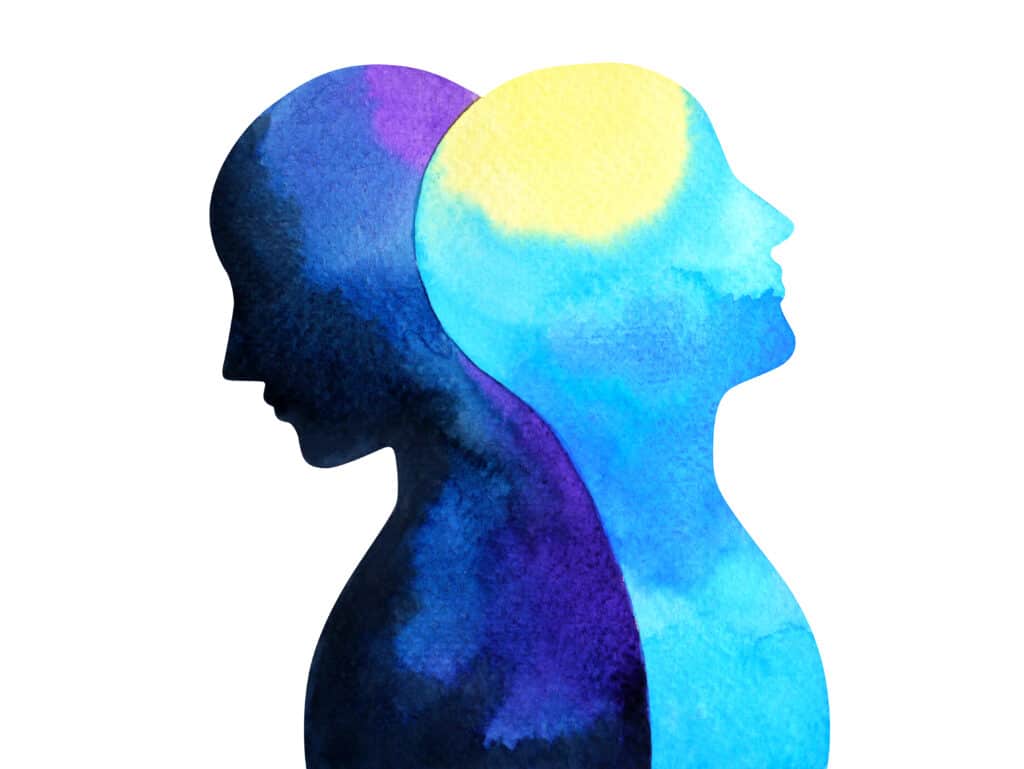
There are many categories of mental illness that are recognized by the DSM 5 (Diagnostic and Statistical Manual of Mental Disorders, Version 5), and most of them fit into these 4 common categories. All mental illnesses should be taken seriously. Some disorders can harm a person’s health or make it extremely difficult to function in society. Many symptoms of mental illness can be better regulated with medication or therapy. We will break down just a few mental health diagnoses in each category.
Mood Disorders
These mental illnesses are typically caused by an imbalance of brain chemicals or stressful life changes. Mood disorders also tend to be passed down from family members.
Depression
The most common mood disorder is depression. There are multiple subcategories inside the mood disorder of depression like Seasonal Affective Disorder. Major depression can cause people to withdraw from family members, lose interest in hobbies, struggle to see anything good in life, and may have mood swings. The difference between normal feelings of sadness and a depression disorder is that the feelings of hopelessness are prolonged for months or years.
Bipolar Disorder
Unusual shifts in mood make it difficult to go about daily life when you have bipolar disorder. Those with bipolar disorder will go through stages of mania and depression which will change their energy levels and behaviors. The cause of bipolar is still unknown, but brain structure, genetics, and the environment can play a role.
Hypomania
Those with hypomania experience extremely heightened emotions. Extreme happiness can occur at one moment and the next can come with highly aggressive behavior. Some people with Hypomania Disorder will have rushed speech, a highly inflated self-esteem, reduced need for sleep, or racing thoughts.
Causes of Hypomania can include:
- Genetics or previous history of bipolar
- Side effects of certain medications
- Recreational drugs
- High levels of stress
- Traumatic or emotional experience
Anxiety Disorders
Those with anxiety disorders experience heightened worry, panic, or even obsessions that could be rational or irrational. This can cause severe stress and it will be hard for those with anxiety to set aside the worry while going about their life.
Disorders in the categories of mental illness can also present as physical symptoms. Other symptoms that come with anxiety can include fatigue, sweating, trouble sleeping, gastrointestinal problems, avoiding activities, and restlessness.
Panic Disorder
Panic Disorders involve repeated episodes of fear, terror, and anxiety. These usually look like rapid breathing, heart palpitations, or chest pain. The person experiencing the panic attack can have terror about many different situations, even before they have occurred.

Many people with panic attacks have impending doom about stressful situations or interactions they are nervous about, just minutes after learning about them. Panic attacks can occur multiple times up to the event and during the event.
Generalized Anxiety Disorder
Those with general anxiety disorder have persistent feelings of worry and anxiety. It often occurs alongside other anxiety disorders as well. Anxiety causes concern about routine events, upcoming interactions with others, and irrational fears. It can control how a person reacts and acts physically.
Agoraphobia
This form of anxiety makes people fear and avoid places or situations that may cause them to feel trapped, helpless, or embarrassed. This fear can translate to any situation, even if it is with family members or with people they are comfortable with. Many people with Agoraphobia benefit from certain antidepressants like Prozac or Zoloft.
Personality Disorders
Personality mental illnesses affect how a person sees the world around them and how they view themselves. Usually, people are adaptive to the world around them and their personalities may flex when they are with different people or in certain environments. Those with personality disorders have a hard time connecting and trusting others.
Narcissistic Personality Disorder
People with the disorder are often preoccupied with fantasies of power, wealth, beauty, fame, or the perfect romance. They often believe that they are better than their peers. While Narcissists may seem like they have unbreakable self-confidence, many of them can experience guilt or shame when their weaknesses are brought to light.
Borderline Personality Disorder
Those with Borderline Personality Disorder struggle to regulate their emotions. These people can be very impulsive and struggle to form lasting relationships. Those with BPD will struggle with the fear of abandonment as well as have rapid changes in their self-identity. Personality disorders can also cause a person to perform risky behaviors like gambling, substance abuse, or risky sexual activity.
Paranoid Personality Disorder
Long-term distrust or suspicions of others are what plague those with PPD. Personality categories of mental illness are usually based on the person’s eccentric thoughts or actions. PPD individuals do not experience hallucinations, but they are constantly on guard and believe that people are going to harm them.
Psychotic Disorders
These disorders are considered psychotic in the categories of mental illness because they cause people to have a loss of reality. They directly affect a person’s ability to think and rationalize. While many of these disorders can be treated, severe symptoms make it hard for people to live a normal life.

Schizophrenia
This disorder causes hallucinations and delusions that last longer than 6 months. Schizophrenic patients may also struggle to show emotion or connect with people on a deeper level. Because of their delusions, patients with schizophrenia may lose trust in others over something they believe to be true even if it is not.
Substance Abuse Psychotic Disorder
Not all mental illnesses are passed down through genetics or are a result of trauma. Using drugs or other substances can alter your brain in similar ways to a psychotic disorder. The withdrawal from drugs can cause hallucinations and outbursts. Delusions can cause people to hear, see, or feel something that is not really there. This could lead to harm to themselves or others.
Delusional Disorder
Those with delusional disorder obviously experience delusions, but it typically focuses on one or a handful of delusions that are firmly held. The delusions could be something that is likely to occur (like the deception or cheating of a spouse) or it can be unrealistic, (being stabbed but having no scars). There are multiple types of Delusional Disorders, including:
- Jealous
- Erotomanic (romantic)
- Persecutory
- Grandiose
- Somatic (bodily)
Dealing With Different Mental Illnesses
No matter what categories of mental illness your diagnosis may fall under, seeking help is always a healthy option. Working in talk therapy and taking medication can help you manage your symptoms and build better interpersonal relationships.
Ogden Psychological Services works to treat many mental illnesses and even offers Neurofeedback for certain patients. If you believe that therapy would be helpful for you, feel free to fill out our contact form. We are also available to answer any questions you may have.



